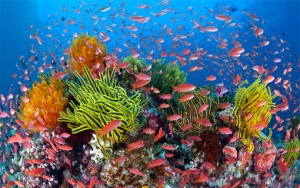Don’t you ever wonder why people always encourage to “look, but don’t touch” when it’s clear that it shouldn’t be touched. Well, sometimes people don’t realize that touching the object can harm the individual as well as cause damage to the object. The phrase is heavily stated for tourists visiting the Great Barrier Reef in Australia. This is because the coral reef is becoming more fragile and if efforts are not put towards sustaining it the coal ecosystem may soon “be reduced to piles of rubble,” Jonathan Erez stated. The Great Barrier Reef being one of the seven wonders of the natural word, contains over 1,500 fish species, and 30 species of marine mammals. It’s a spectacular sight, but recently there has been a fourty percent decline in deposition of calcium carbonate in the coral due to higher acidic levels in sea water, resulting in weaker reefs that are able to withstand the vigorous ocean activities. In efforts to sustain the reef, I agree that the federal and Queensland government’s Reef 2050 Long-Term Sustainability plan isn’t very effective, as it has unspecified actions. I believe that with the coral reef deteriorating, this may lead to not only a huge loss of biodiversity, but a loss in Australia’s economy in which it generate $5.6 billion alone from the great barrier reef in the tourism industry. Lastly, it depicts how crucial climate change is affecting many important ecosystems on the planet.
